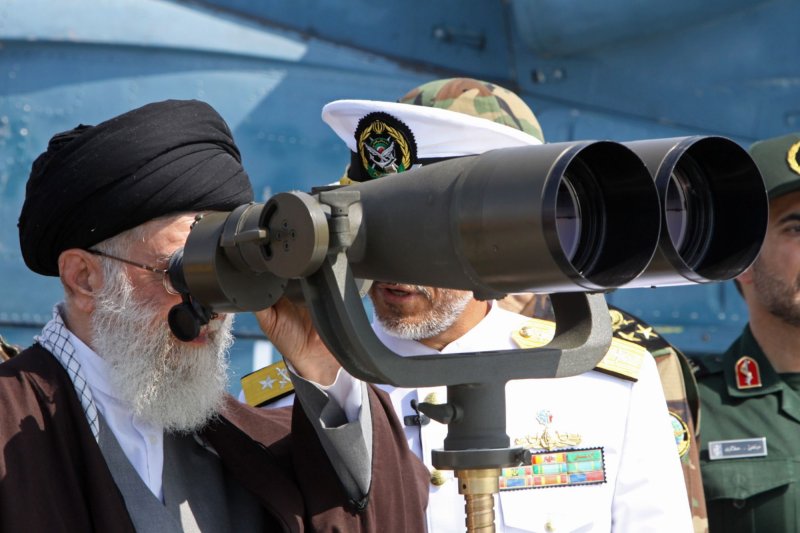1 of 4 | Iranian Supreme Leader Ayatollah Ali Khamenei looks through binoculars during the delivery of the first indigenously designed and developed guided-missile destroyer Jamaran in southern Iran, on February 19, 2010. This handout photo was made available by the official website of Khamenei. UPI/HO |
License Photo
TEL AVIV, Israel, Feb. 22 (UPI) -- Israel announced Tuesday it successfully tested its Arrow anti-ballistic weapon in what appeared to be a timely demonstration of its military might as Iranian warships deploy in the Mediterranean for the first time in three decades.
The Jewish state is already alarmed by the downfall of the Cairo regime, linchpin of Israel's security policy since they signed a landmark peace treaty in 1979.
That's the same year another key ally of Israel, the shah of Iran, was toppled under circumstances not much different to those in play today, ushering in the era of Islamist terrorism with Israel a major target.
So the arrival of the Iranian frigate Alvand and a supply ship, the Kharq, in the Suez Canal while the Arab world is gripped by unprecedented political upheaval has heightened the considerable consternation sweeping Israel.
The aging British-built ships, en route to Syria, hardly constitute a military threat but no Iranian vessel has used the canal since the Islamic Republic was established, while Israel has sent missile boats and one of its Dolphin-class submarines southward into the Red Sea over the last two years.
Israeli Prime Minister Binyamin Netanyahu declared, "We can see what an unstable region we live in, a region in which Iran tries to exploit the situation that has been created in order to expand its influence by passing warships through the Suez Canal."
He viewed the Iranian expedition, however modest, into the Mediterranean, Israel's backyard, "with the utmost gravity."
He argued that Tehran's actions amid the political upheaval showed that Israel should expand its defense readiness.
The Arrow-2 test over the Pacific against a simulated Iranian ballistic missile had presumably been scheduled for some time but it assumed political overtones as Israel grappled with a new reality.
Even before Hosni Mubarak was forced to step down as Egypt's president Feb. 11, Israel had feared that its peace treaty with Egypt, and a 1994 pact with Jordan, could be in deep jeopardy.
If those agreements were abrogated, Israel's entire regional policy would collapse.
The possible emergence of hostile Arab regimes in Cairo, Amman and elsewhere would mean the Jewish state would have to conduct a sweeping upgrade of its military readiness.
Forces would have to be deployed on its southern and eastern borders again. But the army disbanded its desert warfare brigades following the 1979 treaty. It will take time to retrain units for fighting in the Sinai wastes.
After Israeli Prime Minister Menachem Begin signed the peace treaty with Egyptian President Anwar Sadat at Camp David March 26, 1979, the Jewish state's defense budget fell from 30 percent of its gross national product to 7 percent.
"For more than two decades, the structure of the Israeli forces was based on the assumption that Egypt is in no way a potential threat to Israel," said former Deputy Defense Minister Ephraim Sneh.
"I don't say that Egypt today is a threat. But what's happening there may change the status of Egypt vis-a-vis Israel as far as strategic balance is concerned. And that's why Israel must change the structure of all of its forces."
Egypt's U.S.-armed and trained forces still carry out exercises in which Israel is "the enemy." But its armed forces haven't seen combat since the 1973 war, when they took Israel by surprise by crossing the Suez Canal before being crushed.
There seems little appetite in Egypt for a new war. But while the treaty was a strategic boon for Cairo, which was rewarded with some $60 billion of U.S. aid, the agreement has never been popular with the people.
If the Jordanian monarchy falls because of the ever-widening political turmoil in the Arab world, Israel's problems would be dangerously compounded. An estimated 60 percent of Jordan's population is Palestinian.
"Israel's strategic environment is about to change," observed Daniel Levy director of the Middle East Task force at the New American Foundation in Washington.
Mubarak loathed Iran, as Israel does. It is unlikely in the extreme that he would have allowed Iranian warships to use the Suez Canal to move from the Red Sea to the Mediterranean.
So now he's gone, Tehran's potential for exploiting the turmoil in the Arab world, and the threat to regimes allied with the United States, has increased exponentially, heightening Israel alarm.





